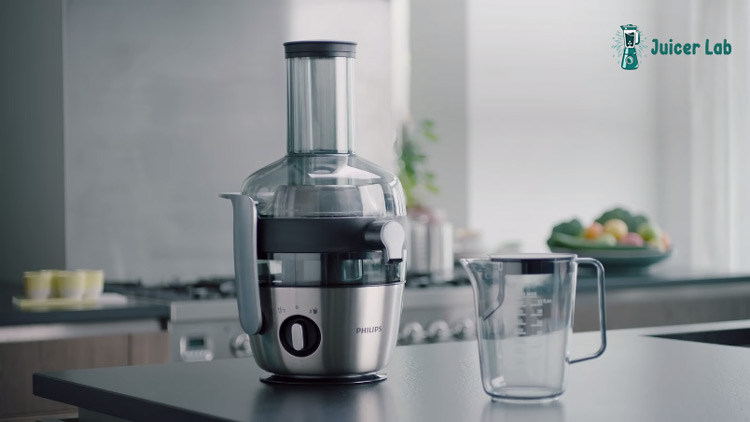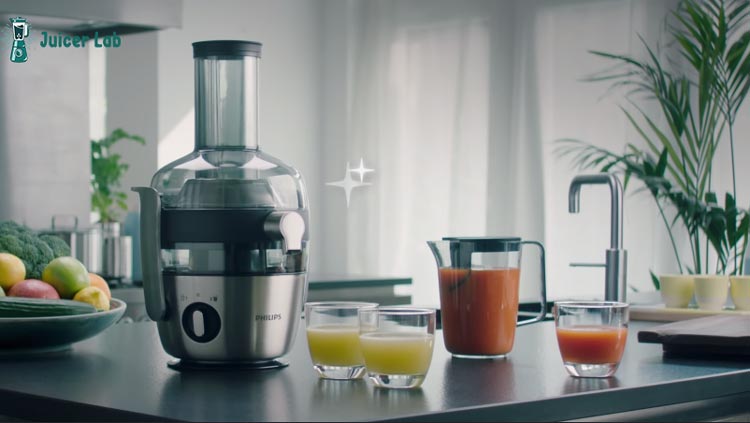When someone thinks of a juicer, most likely, the image of a centrifugal one comes to mind. Centrifugal juicers are typically seen in commercial places as they’re fast and efficient.
However, time and efficiency don’t mean everything when it’s intimated with your health. So, is centrifugal juicer healthy?
Centrifugal juicers are generally considered to be healthy, as they extract more juice from fruit and vegetables than masticating juicers.
However, some argue that the high speed of the centrifugal action can actually damage the cell walls of produce, leading to decreased nutrient content. What’s the real fact? Let’s deep dive.
What is Centrifugal Juicer?
Centrifugal juicers were the most common type of juicers before juicing entrepreneurs invented slow-pressed juicers at the beginning of the 20th century.
These juicers use a rotating blade that can spin at high speed similar to a centrifuge, to separate the flesh from liquids. The juice is then filtered while its pulp is drained into a different container.
Contents
Do Centrifugal Juicers Really Destroy Nutrition?
A lot of myths circulate around centrifugal juicers. One of the most common questions from newcomers to their morning juicing lifestyle is, do centrifugal juicers destroy nutrients?
The answer is yes; centrifugal juicers supposedly destroy about 15% of the nutrients available in the original fruits and vegetables. However, there’s some dispute over whether this is actually true as there’s no scientific evidence.
Some experts claim that the oxidative reactions that happen during juicing negatively affect the nutritional content of the juice and destroy more nutrients than other types of juicers, while others claim that the difference is minimal.
However, if we analyze the working mechanism of centrifugal juicers, a fact comes forward. Centrifugal juicers are known as the fastest type of juicer. Their incredibly fast movement seems to be the main issue.
This is because the faster the speed, the more heat that’s added, destroying the nutrients and the enzymes in the juice. However, numerous vitamins remain stable although heated.
Besides, there isn’t enough evidence to suggest that the high temperature of a juicer breaks down these nutrients so rapidly. Eventually, that which makes absolutely no factor is evidence that can stand the test.
Is Centrifugal Juicer Healthy?
Juicing is an essential part of the diet for people who take their health seriously. Actually, there’s no way to say any juicer is completely unhealthy. The same goes for centrifugal juicers as well.
However, the sole thing that makes a difference is the nutritional value of the final output. As I’ve discussed, it’s thought that centrifugal juicers retain just 85% of the nutritional value present in raw fruits or vegetables.
Centrifugal juicers quickly crush vegetable matter with the use of small teeth on a rotating basket, and the brand-new producing liquid is then forced through a sieve composed of fine mesh.
This method functions fairly rapidly but can lead to the formation of foam, which many find unattractive or may lead to oxidation in the juice contents. Some other claims the excess temperature due to the higher speed of centrifugal juicers kill enzymes.
But, it might not be applicable for your daily juicing since research suggest that the temperature should be at least 140℉. Moreover, the duration of this temperature is also important.
So, simply put, centrifugal juicers are healthy. However, you have to be a bit picky while choosing your fruits. Centrifugal juicers are mostly suitable for juicing apples, carrots, and other hard fruits or vegetables, as opposed to leafy greens with high fiber content like wheatgrass and kale.
Advantages of a Centrifugal Juicer

Centrifugal juicers are known for quickly and efficiently extracting juice from fruits and vegetables. They have several advantages that may be of interest to some consumers. Let’s have a look at them.
1. Efficient and Easy to Use
The scarcity of time may limit your ability to get any large quantities of juice. Centrifugal juicers make it easier to cast off pulp than many other juicers do.
So, you can make large amounts of juice using this type of juicer in a short period of time easily and without much trouble.
The juice extracted from these devices is usually much thinner than what you’d get with a masticating juicer because the foods are cut into smaller pieces before being passed through the machine.
This easy, efficient process lets you add whole fruits or vegetables to a juicer, so it consumes much less time to prepare a tasty juice.
With the convenience and efficiency of centrifugal juicers, your patrons can enjoy delicious juice that is ready in no time.
2. Fast Juicing
Centrifugal juice extractors are known as a good bet for being considerably quicker. They typically don’t need any additional assistance once the bits of pulp and juice come out and are separated from the fruit or vegetable.
All you have to do is pour your fruits or vegetables into the juicing machine, and the centrifugal juicer will take care of the rest of the work.
Some of these machines feature baskets you can pour the pulp through right away to obtain the finest juice you can.
3. Widely Available and Affordable
Centrifugal juicers are understandably popular selections in the juicing world. As a consequence, they’re widespread and relatively simple to set up at a food outlet.
In addition, the simplicity of the centrifugal juicing process also makes centrifugal juicer machines more affordable than standard juicer apparatus.
4. Compact and Easy to Store
Centrifugal juicers are now available in a smaller style that is simple to store, clean, and use in your kitchen. It even fits perfectly in your office!
The smaller-size juicer is just as powerful and boasts a slower speed of around 15,000 RPM. A standard model can process 24 ounces of fresh juice in just one minute.
5. Suitable for Hard Fruits and Vegetables
A centrifugal juicer will be your best bet if you’re fond of drinking apple juice or juice from other hard fruits and vegetables. Centrifugal juicers use a rotating blade to break down the food’s cell walls, allowing the juice to flow more easily.
They work by breaking down fruits and vegetables into small pieces that the body can easily absorb. This makes them ideal for hard fruits and vegetables, which can be tough to juice with other types of juicers.
6. Convenient Cleaning and Maintenance
Due to its ease of cleaning and high standard of durability, a centrifugal juicer is a major reason why it’s so popular among commercial businesses.
They feature stainless steel components along with some removable magnetic parts, making maintenance much easier than with traditional juicers.
This level of quality and ease of use is why it continues to last, ensuring that your centrifugal juicer remains in excellent condition for a long time.
Disadvantages of a Centrifugal Juicer
Centrifugal juicers are often considered the best type of juicer because they’re fast and efficient. However, there are some disadvantages to using a centrifugal juicer you should be aware of. These include:
1. Loss of Nutrients
Centrifugal juicers extract juice from fruits and vegetables by spinning them around at high speeds, breaking down the food’s nutrients and removing valuable enzymes.
In addition, they can also produce more foam than horizontal juicers, which means less juice is extracted, and a higher price is paid per ounce.
2. Noise
Centrifugal juicers are known for being noisy because of the spinning motion. The noise is created when the blades make contact with the ingredients and create a sonic boom.
Once again, the key reason for this sonic boom is that centrifugal juicers are much faster than traditional juicers, making the blades travel much faster.
3. Not Suitable for Herbs or Leafy Greens
Centrifugal juicers are not suitable for leafy greens or herbs because they do not remove all the fibers, which can leave a bitter taste in the juice.
Additionally, centrifugal juicers are less effective at extracting nutrients from plants. They break the cell walls, leading to a loss in nutrients and increased chances of oxidation.
Things to Check before Buying A Centrifugal Juicer
Every kitchen aficionado wishes that his purchases are worth their cost. For this, you have to be cautious about certain factors. So, some tips have been listed below to help you choose centrifugal juicers.
Construction
Your juicer needs to be strong enough to withstand the high-speed spinning of the chamber. After it’s positioned, the disc chamber must fit perfectly with the base to provide maximum stability.
The locking arm should be strong enough to resist rust, and the pins and clips should feel stable when locking it. You can certainly do without getting a metal disc flying into your face at that speed!
There also shouldn’t be a space between the front, the pulp collector, and the juice collector. Otherwise, things may become more loosened after a couple of months of use, and the juice and the pulp may splash across the countertop each time you try and use the juicer.
Motor Power
The potency of a juicer is impactful in both the speed at which it’s capable of carrying out a dual task and its ability to perform a big job.
Usually ranging from 400 to 12,000 Watts, higher motor power makes the juicer more proficient at digesting tougher foods, as one with a higher wattage won’t be able to process tough substances as well.
A powerful motor ensures that the juicer does a better job of unveiling the goodness out of healthy foods that may otherwise be difficult to digest when diminished motor power heats the jar.
Chute Size
Whizzing whole apples and other foods using a centrifugal juicer are important for people who want to decrease the time spent preparing food before juicing.
The feeding tube must be at least 3 inches wide, as the narrower the feeding tube, the more time it’ll take to pre-prepare the feeding tube. Nonetheless, the longer the chute, the more you’ll have to employ a pusher to run the veggies through the juicer.
Depth of Spout
Because the juice will end up being misted in as a result of the tube slanting downward, the tube must be long and somewhat angled downward to prevent the juice from being misted and messed up.
Look out for models with a juice jug permitting the spout to be lined up inside – these are the ones that work most effectively.
FAQs
- Is centrifugal juicer better than slow juicer?
Centrifugal juicers are quicker than traditional juicers because they use centrifugal force to squeeze out the juice, a process requiring greater speed. Slow juicers have to use more force in filtering the juice if they have to use friction and heat, because the filter is often fixed, and lack of friction and heat won’t be able to enable it to filter juice quickly enough.
- Can you juice spinach in a centrifugal juicer?
Yes, you can juice spinach. Spinach is tender green and requires a more powerful juicer for juicing. With a Breville centrifugal juicer, you may get spinach juice, but a lot of it will inevitably be thrown out in the trash because the pulp tray isn’t designed to keep things like spinach.
- Do centrifugal juicers requires to peel fruits?
Depending on the type of fruit you’re going to juice, you’ll need to strip away the skin before juicing it. For instance, the skin of oranges is filled with bitterness, aspirin, and oils that might cause digestion issues, so you have to peel the skin.
Conclusion
So, what do you think? Is centrifugal juicer healthy? In my opinion, centrifugal juicers aren’t inherently unhealthy at all, but they should still be used with caution. They can be a great way to get nutrient-dense juices, but they should only be used if they are properly cleaned and monitored.
